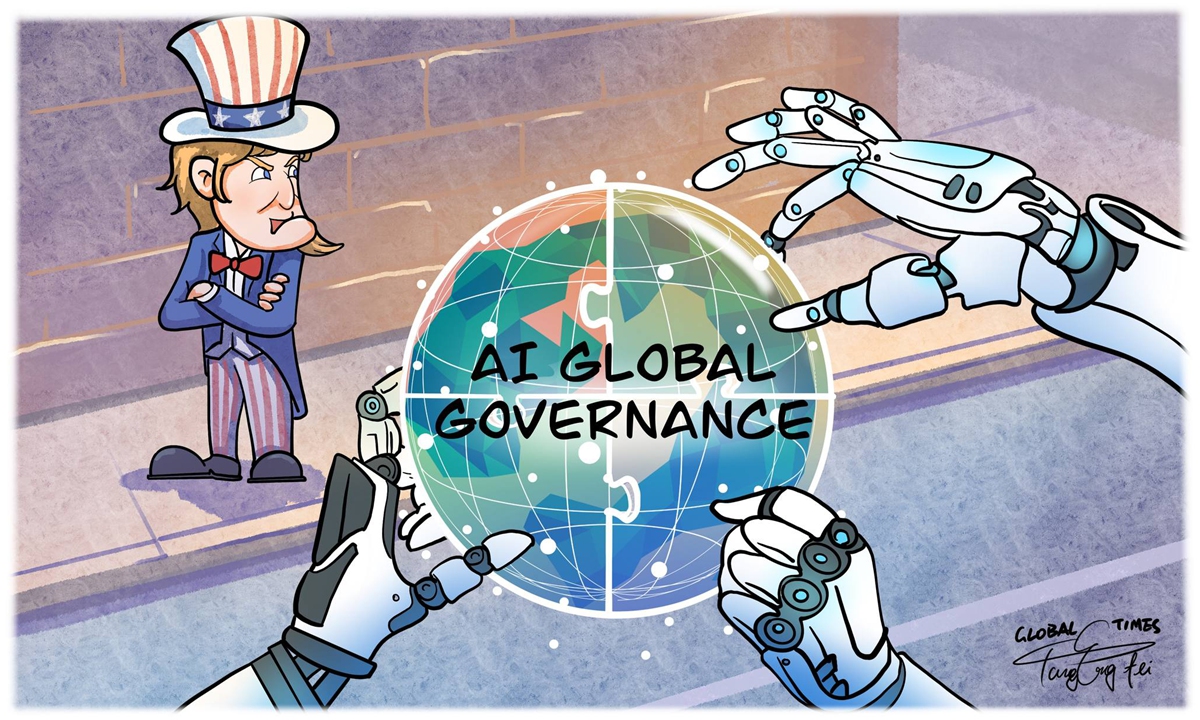
Illustration: Tang Tengfei/Global Times
Artificial intelligence (AI) is a cutting-edge technology that the world's scientific and technological powers compete to develop. In the military field, the development of "AI-powered autonomous weapons" has become the focus of technology applications. Currently, the "revolving door" phenomenon produced by US politics has appeared in the technological, political and military realms.
It is obvious that the US has recently been stepping up the promotion of AI technology in the military and intelligence field. US President Joe Biden signed a memorandum on Thursday, instructing national security agencies to accelerate the adoption and integration of AI systems. As some US media reports commented, this shows that the US military and intelligence agencies are required to "more quickly embrace and deploy artificial intelligence as a matter of national security."
The world's concern about the security and humanitarian risks behind such a move from the US has grown stronger. For emerging technologies that still face imperfections in regulation and governance, the promotion of their weaponization needs to be built on a complete risk-control system. Otherwise, its unpredictability and uncontrollability will pose a major threat to global peace and security. The US' unilateralist concept of security has jeopardized the security interests of other countries and exacerbated the arms race in the field of AI military applications, to a certain extent, while hindering the process of AI security governance. There are certain differences in the positions, attitudes and views of countries participating in AI security governance, and the future of the governance of AI military applications remains uncertain.
International cooperation is especially needed in the field of AI security governance, and the common wisdom of mankind should become a "creator" of human happiness, not a "stumbling block" to security and stability. We should strengthen common security in the field of AI and fully support the UN in playing its role as the main channel of global scientific and technological governance. We also need to appropriately respond to all kinds of AI security issues and challenges, ensuring that AI is always under human control.
In order to truly promote the effective governance of technology, it is necessary to abandon the zero-sum mentality. Adhering to the principle of indivisibility of security, we resolutely oppose prioritizing the security of one country over the insecurity of others. Only by effectively respecting and safeguarding the legitimate security concerns of each country, and group, can we truly safeguard the common security interests of the majority of the global community from infringement.
To promote safe collaboration in the field of AI, it is essential to encourage broader participation from various stakeholders. Countries around the world are facing similar security threats in an increasingly uncertain and unstable environment, and thus should become active "participants" of security governance. Ensuring that global issues are addressed by all countries and that global rules are established collectively is crucial for achieving more open and inclusive governance in the technological realm.
The development and application of AI across various fields, especially in the military domain, are significantly affecting the global security environment. However, the specific forms, means and consequences of these impacts remain uncertain, and how new security risks evolve is yet to be observed. Therefore, it is vital for the international community to jointly explore safe development paths for military AI.
Recent international practices have shown that achieving collaborative security governance is not an easy task. With respect to military AI, on the one hand, certain countries have severe tendencies toward pan-securitization and unilateralism, continuously constructing technological barriers and digital divides. The technological competition and "cold war" in science and technology are becoming realities. On the other hand, the dual-use nature of AI, to some extent, increases the costs of trust between nations and raises the threshold for global cooperative governance. To this end, the international community needs to actively seek cooperation paths.
The author is a scholar at the CPC Theory Innovation Research Center of the Armed Police Force. opinion@globaltimes.com.cn



